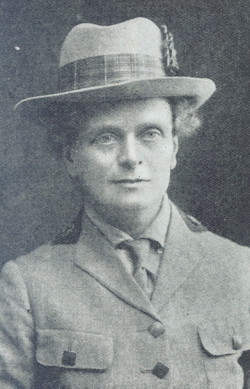
Elsie was born on the 16th August 1864 at Naini Tal in India. Her father John Forbes David Inglis was a chief commissioner in the Indian Civil Service. She was one of six siblings. Her father retired in 1876 and after a two year period in Tasmania, where two of her eldest brothers had settled, returned to Edinburgh.
Fortunately for Elsie her father considered education for his daughter just as important as for a son. It was in Edinburgh, and then Glasgow, that Elsie studied medicine, something that was unusual and difficult for a woman to achieve. However she passed the requisite exams in 1892 and took up the position of house surgeon at a new hospital for women in Euston Road London. She was also an ardent supporter of women’s suffrage.
Elsie returned to practice in Edinburgh and studied for further medical degrees at the University of Edinburgh graduating MB, CM in 1899. She now dedicated her life to her work, including the founding of a nursing home and maternity centre, and the suffrage movement.
When war broke out in 1914 Elsie visited the War Office to offer her services. At the time the war was perceived to be short affair, and consequently Elsie received the historic remark: ‘My dear lady go home and sit still’. The remark became famous amongst British nurses working in Serbia. Whilst working under terrible conditions they would ask as to what was their next task. The answer, received with much amusement, would be the famous remark. Elsie had been instrumental in setting up a fully equipped nursing unit for the Serbian Army.
In the spring of 1915, when the current head of the unit at Kraguievatz went down with diphtheria, that Elsie went to there to take over the unit. It was primarily involved with combating typhus, a decease which ravaged Serbia in 1915. Other Serbian hospitals were in a terrible condition and it would be Elsie that championed the need improvements. She would eventually gain ‘heroine’ status. She became the first woman to be awarded the Order of the White Eagle, Serbia’s highest honour.
As the Germans overran Serbia later in 1915 and personnel were encouraged to evacuate, Elsie refused to go. She and her unit were made prisoner and were eventually repatriated in 1916. She campaigned further and in 1917 was back with another unit treating Russian troops. After the Russian Revolution she and her team were evacuated home in November 1917. However, by now she was very ill suffering from cancer and died on the 26th November 1917. She is buried in Edinburgh.
Explore more memories from the ribbon
-
Ernest Farrar
Judith Farrar told us the story of Ernest Holdsworth Farrar, the Great Uncle of her husband, Don. Ernest Farrar was born in 1882 in Leeds, after a spell at Teacher Training College in Isleworth, Middlesex he went on to study at Trinity College, Cambridge. He attained both a BA and BSc. After his graduation, Ernest spent some time in Dresden in Germany, and while the reasons for this sojourn are no longer known, it is highly likely that he continued as an academic at the University of Dresden. On his return to England Ernest was appointed to the Headship at Todmorden Secondary School. This important work continued after the outbreak of the First World War, but with the introduction of conscription in January 1916, Ernest was compelled to face several Tribunals when it was insisted that he enlist. The School Governors tried to intervene and to keep him as Headmaster, but he was sentenced to 6 months in Wormwood Scrubs prison. After an unsuccessful appeal, Ernest was sentenced by the Central London Tribunal to 6 months in Dartmoor Prison in 1917. His reasons for refusing to fight are given in the extract from the Yorkshire Post.
-
Wilfred Carver
Submitted by Angie Atkinson. Wilfred Carver, Royal Marines Light Infantry (16955), was born in 1895. He died on the 26th of November 1914 while on the HMS Bulwark. He is remembered on the Portsmouth Naval Memorial.
-
Captain Frank Woodcock
Captain Frank Woodcock 5th Battalion of the Yorkshire Regiment Captain Woodcock, who was only 22 years of age, was the youngest son of John and Elizabeth Woodcock of Driffield Yorkshire. He was killed in action during an assault on the 15th of September 1916. Frank was one of 6 children having 2 brothers and 3 sisters, the family must have been “comfortably off” because the 1901 census records his father as “living on his own means” and they had a servant called Margaret. He was educated at Bridlington School, where he was in the Officer Training Corps (O.T.C.). He became a Second Lieutenant in a Territorial Battalion in December 1912. He was promoted Lieutenant in April 1914 and then to Captain in May 1915. The Regimental Gazette recorded his death as follows: “The death of Captain Woodcock deprives his battalion of a very capable Company Commander and a very popular Officer. Despite his youth, he very soon proved himself an Officer of much resource and dauntless courage. He was wounded when wiring in front of the trenches in July 1915, and returned to France in January 1916 when he succeeded to the command of a Company. It was in this capacity that he showed himself a cool and capable Commander with great initiative and pluck, always setting a fine example to his men when any dangerous work had to be performed. He was twice mentioned in despatches. Captain Woodcock is buried at Flatiron Copse cemetery in France.
